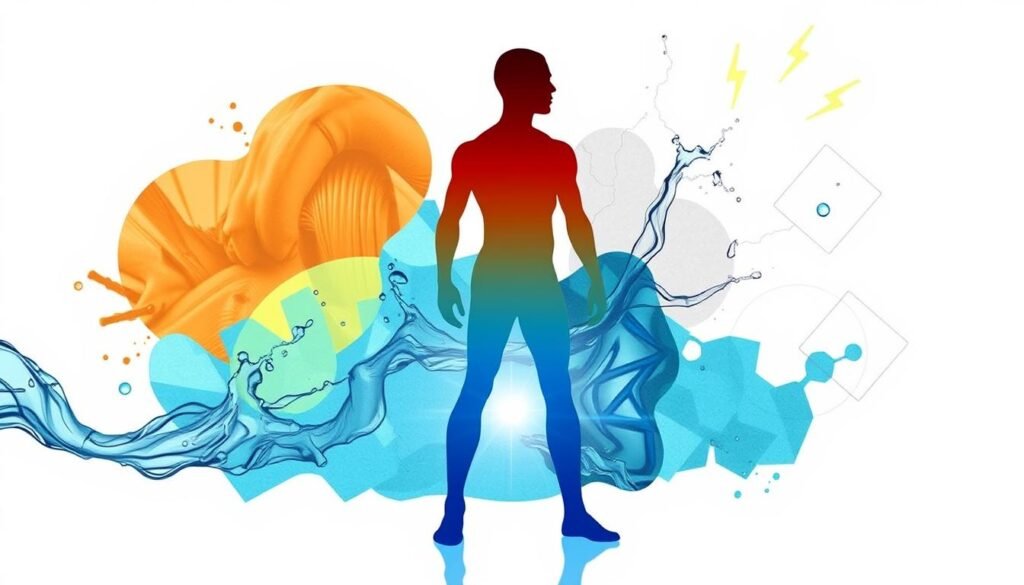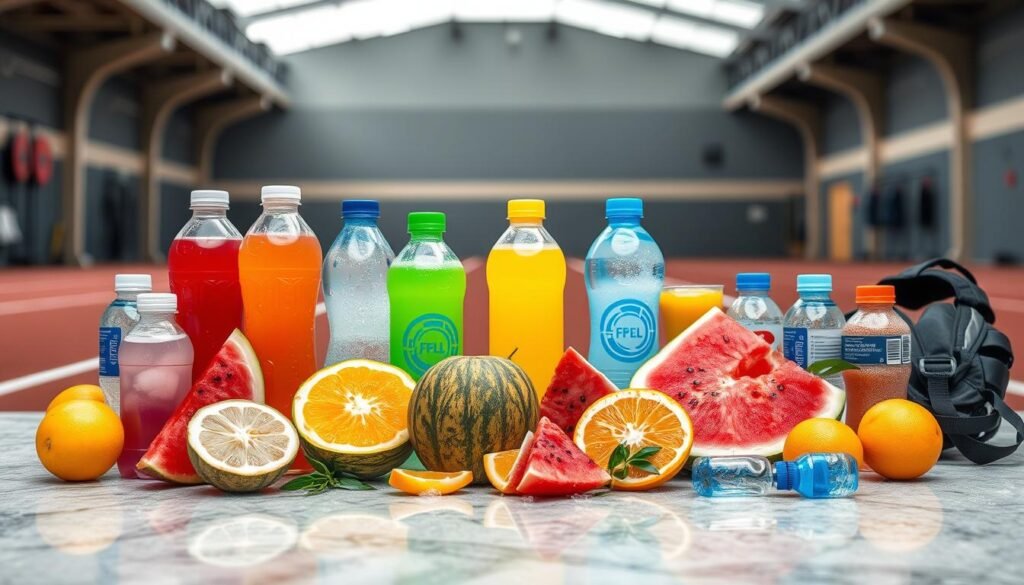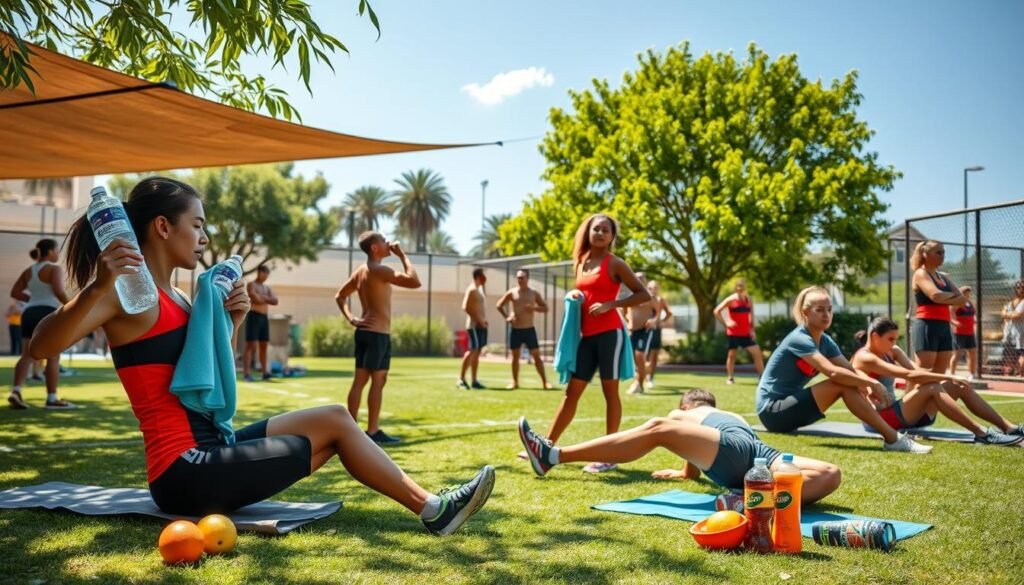Did you know losing just 2% of your body mass to dehydration can hurt your exercise abilities? It’s a big deal for athletes because staying hydrated is key for top performance. When you don’t drink enough, it affects not just your energy, but also how well your muscles recover after working out.
Dehydration makes it harder to perform and slows down muscle recovery. Knowing this, athletes can drink more water to keep their energy up and recover faster.
Key Takeaways
- Dehydration of >2% can negatively impact exercise performance.
- Muscle recovery is prolonged in dehydrated individuals.
- Exercise-Induced Muscle Damage may worsen with dehydration.
- Strategies to remain hydrated are essential for recovery and performance.
- Understanding hydration’s role helps in minimizing muscle fatigue.
Understanding Dehydration
Dehydration happens when you lose more water than you drink. This issue affects your health and how well you perform in activities. Dehydration is not all the same; it ranges from mild to severe. Each kind has its own effects on the body. When your body doesn’t have enough water, this is called hypohydration. It can cause serious problems, especially when you’re doing intense physical activities. It’s important to understand these types. This knowledge helps you know if you’re hydrated enough and what to do to stay hydrated.
Definition and Types of Dehydration
Dehydration is split into different severity levels:
- Mild Dehydration: When you lose up to 2% of your body weight. This might affect how well you perform.
- Moderate Dehydration: Losing between 2% and 5% of body weight. This can make you noticeably weaker in physical activities.
- Severe Dehydration: Losing more than 5% of body weight. This level can drastically impact body functions and make you very tired.
Physiological Impacts of Dehydration
Dehydration affects many parts of the body. One issue is impaired thermoregulation, where the body can’t keep its temperature stable. Another problem is higher plasma osmolality, caused by losing body water. This can make your heart rate go up and your stroke volume go down. These changes put a strain on your heart and lower your exercise performance. Also, dehydration can make it harder for muscles to contract. This results in tiredness and less strength, which is a big problem for athletes doing long workouts.
The Relationship Between Dehydration and Muscle Recovery
Dehydration has a big impact on how muscles recover after exercise. It’s very important for people who are active to stay hydrated. This helps muscles repair efficiently after working out. This is especially true for athletes who push their muscles hard.
How Dehydration Affects Muscle Repair
Dehydration affects the body’s ability to fix muscles. When we don’t drink enough, our cells don’t work as well. This makes it hard for muscles to heal after exercise. Studies show being well-hydrated helps muscles heal properly. Not drinking enough water can make recovery take longer. This means it takes more time for our bodies to fix the damage from a tough workout. Drinking water regularly helps fix muscles and keeps them from getting worse over time.
Time Taken for Recovery During Dehydration
Recovery time goes up when you’re dehydrated. That’s why drinking enough water is so important. Even a small dehydration – like losing 2% of body weight – can lower how well you perform. It can also make muscle damage worse. This makes recovery slower. As you lose more fluids, recovery and easing soreness take even longer. So, athletes need to keep track of how much they drink. This helps them recover well from dehydration. With not enough water, our bodies can’t fix muscles as fast after hard exercises.
Athletes should focus on getting enough water and improving recovery methods when they’re dehydrated. Knowing how hydration and muscle repair are linked is key. It makes a big difference in how well you perform and your energy levels.
<!– For further details, refer to the research findings. –>
Dehydration, Muscle Recovery, and Energy Depletion
Dehydration lowers how well athletes perform. This includes muscle work and staying power. While working out, a person can lose up to 2 quarts of fluid and salt every hour. During long-lasting events, this loss can jump to 3 quarts each hour.
The link between hydration and energy is strong. Losing just 2% of body mass dramatically drops physical strength.
Impact on Overall Performance
Not drinking enough water makes you less flexible and slower. It also makes breathing harder. Mood swings from not being hydrated can also mess with how well athletes do. Keeping enough potassium and magnesium is key because they help stop cramps and tiredness.
As these crucial minerals get used up, athletes might cramp up or feel very tired. It shows why it’s vital to drink enough, especially during exercise.
Indicators of Energy Depletion
Fatigue, feeling dizzy, and getting confused are signs you’re running low on energy. Athletes need to pay attention to these. They often mean you’re not drinking enough. A faster heartbeat and breathing more can also mean energy levels are dropping.
Noticing these signs early helps athletes stay hydrated. This keeps their performance up during training and events.
Electrolyte Imbalance and Its Consequences
Electrolytes like sodium, potassium, calcium, and magnesium are vital for athletes. They help with fluid balance, muscle contractions, and nerve signals. Keeping these minerals balanced is key, especially when you’re sweating a lot during exercise.
Role of Electrolytes in Muscle Function
Electrolytes are crucial for muscles to work right. A lack of them can cause muscle cramps, spasms, and weak performance. So, for athletes, drinking enough and keeping these levels right is super important.
Symptoms of Electrolyte Imbalance
It’s important to know the signs of not having enough electrolytes:
- Muscle cramps
- Fatigue
- Dizziness
- Confusion
- Heart palpitations
- Nausea
- Dry mouth
If things get worse, it could lead to seizures or heart problems. Athletes feeling these symptoms should hydrate right away. Knowing what to look for helps manage hydration better, improving their sports performance.
Understanding Exercise-Induced Muscle Damage
When you push your body hard in sports or exercise, muscle damage can happen. This leads to muscle soreness, often called delayed onset muscle soreness (DOMS). These aches come from tiny tears in your muscles, especially after doing things like lifting weights or running downhill.
This kind of muscle damage can make it tough to move and cause pain. But, it’s also a crucial step in making your muscles stronger and bigger. That’s why athletes need to know both how it happens and how to recover well.
What is Exercise-Induced Muscle Damage?
During tough workouts, muscles can get tiny injuries. This is called exercise-induced muscle damage. It can make your muscles sore and weak for a bit. The more intense the exercise, especially exercises that stretch your muscles like yoga or weightlifting, the more likely you are to get these injuries.
Though these injuries can slow you down at first, they’re actually good for you in the long run. They help your muscles to become stronger and more enduring. For more, check out this study on muscle damage.
How Dehydration Exacerbates Muscle Damage
Not drinking enough water makes muscle damage worse and recovery tougher. Your body needs fluids to fix muscle injuries and to get rid of waste. If you’re dehydrated, inflammation and soreness can stick around longer.
Drinking plenty of water helps your body to heal and recover. It also makes sure nutrients get to your muscles. So, staying hydrated is key for athletes to perform their best and bounce back fast after working out.
Factors Leading to Muscle Fatigue
Athletes need to know what causes muscle fatigue to boost their performance. Muscle fatigue can show up in different ways. Acute fatigue goes away quickly with rest. Chronic fatigue lasts for months, even with rest. We’ll look at what causes muscle fatigue and how dehydration affects it during exercise.
Causes of Muscle Fatigue During Exercise
Muscle fatigue comes from mental and physical sources. Mental fatigue messes with your mind. Physical fatigue weakens muscle performance. Different things affect how motor neurons work during exercise, including:
- Repetitive activation of motoneurons
- Reduced excitatory feedback from the motor cortex
- Increased firing of group III/IV muscle afferents
- Decreased firing of muscle spindles
Exercising can also make your blood pressure go up. This may lessen blood flow to your muscles. There’s also the matter of oxygen. Not enough oxygen makes you more tired.
Influence of Dehydration on Fatigue Levels
Dehydration makes muscle fatigue worse. Losing over 2% of your body mass can cut your exercise ability by nearly 10%. This shows how much dehydration affects athletes. When you don’t drink enough water, you get tired faster. This makes it hard to do your best.
Drinking enough water is key. It helps get oxygen where it’s needed and fights fatigue. This is even more important during hard workouts. Drinking enough helps keep your energy up. It also stops muscle fatigue when exercising a lot.

Hydration Strategies for Athletes
Effective hydration is key for athletes’ performance and health. It’s crucial to focus on hydration before exercise. This helps maintain energy and reduces the risk of dehydration. Knowing how to hydrate well boosts athletes’ performance with smart hydration plans.
Importance of Pre-Exercise Hydration
Pre-exercise hydration is vital for good athletic performance. Research shows 66% of NCAA Division I athletes were dehydrated before practices, affecting their abilities. Drinking 16-20 ounces of water 2-3 hours before exercise is advised. This ensures they start exercises fully hydrated.
This habit combats dehydration’s impact on endurance, strength, and performance, including anaerobic power.
Suggestions for Maintaining Hydration
Creating effective hydration plans is crucial for athletes. Below are tips to help:
- Monitor fluid intake daily to stay well hydrated.
- Drink 7-12 ounces of cold fluids 15-30 minutes before workouts.
- During exercise, drink 4-8 ounces of fluid every 15-20 minutes.
- Use sports drinks with 6-8% carbohydrates in long workouts for better performance.
- After exercising, drink 24 ounces for every pound lost for recovery.
Thirst doesn’t always show hydration levels accurately. Athletes may not feel thirsty until they’ve lost over 2% of their body weight. Proactive hydration is key. Also, understanding hydration needs in different temperatures and checking urine color are good ways to track hydration status. For more, read about muscle fatigue and hydration.
Recovery Techniques Post-Exercise
After a hard workout, it’s key for athletes to focus on recovery. They should rehydrate and eat properly. This can make a big difference in recovery and how well they perform later. Drinking enough helps replace lost fluids. Eating the right foods helps muscles repair and builds up energy again.
Effective Rehydration Techniques
Athletes need to drink liquids with electrolytes to rehydrate well. Drinking about 1.5 liters per kilogram of weight lost when exercising is best. There are many ways to rehydrate. Some need quick drinking in a few hours. Others can take their time, depending on how long they have to recover.
Post-Workout Nutrition for Enhanced Recovery
Good food is crucial for recovery after hard exercises. Athletes should eat carbs and proteins soon after they finish. Doing this in the first hour helps a lot with getting their energy back and muscle repair. Eating about 1.6 grams of protein for each kilogram they weigh is a good rule. This, combined with drinking right, boosts recovery a lot.

| Recovery Technique | Benefits | Recommended Practices |
|---|---|---|
| Fluid Intake | Restores hydration levels, important for muscle function | Drink 1.5 L/kg lost; consider electrolytes |
| Nutrition | Aids muscle repair and replenishes energy | Consume carbs and proteins within one hour; 1.6 g protein/kg body weight |
| Hydrotherapy | Reduces muscle soreness and improves recovery | Cold water immersion or contrast water therapy recommended |
| Rest and Sleep | Essential for recovery and muscle repair | Aim for adequate sleep and rest days between workouts |
Role of Sports Drinks in Recovery
Sports drinks are not just for quenching thirst. They also restore energy and lost minerals after working out. They’re better than water for intense exercise. This is because they help your body absorb fluids fast.
Benefits of Sports Drinks Over Water
Sports drinks have benefits water doesn’t. They give you:
- Enhanced electrolyte replenishment to restore necessary minerals lost through sweat.
- Improved gastric emptying that facilitates quicker absorption of fluids.
- Carbohydrates that help maintain energy levels during long workouts.
Choosing the Right Sports Drink
When picking a sports drink, think about a few things:
- How long and hard you work out.
- Your hydration needs and tastes.
- The right amount of carbs (4% to 6%) and sodium (250 milligrams or more) for you.
These drinks are best for those who exercise hard for more than an hour. Others, especially kids, should not have them often. They can lead to too many calories and health issues if overused.
Preventing Heat Exhaustion During Training
Heat stress is a big concern for athletes, especially when they push their limits during training. It’s vital to understand how heat affects the body. This understanding helps maintain health and performance levels. Athletes need to know how their bodies react to heat. They should drink plenty of fluids to avoid dehydration. Dehydration can lower performance and increase the chance of getting heat-related illnesses.
Understanding Heat Stress in Athletes
Heat stress can happen when the body can’t cool down properly. When you exercise, most of the energy your body makes turns into heat. This could lead to dehydration. If you don’t handle it well, you could get heat exhaustion or even heat stroke. The CDC says heat illnesses are a top danger for high school athletes in the U.S. High humidity and temperature make it even harder for the body to cool down.
Tactics to Avoid Heat-Related Illnesses
There are important steps to prevent heat-related illnesses. Athletes should slowly get used to warmer conditions over 1-2 weeks. Drinking fluids regularly is key to staying hydrated. It’s recommended to drink 24 ounces of fluid without caffeine two hours before exercise and 8 ounces just before starting. During exercise, drink 8 oz. of water every 20 minutes.
Try doing tough workouts when it’s cooler. Having shaded areas, places to cool off, and water stations at events is very important. Knowing personal factors, like body fat or certain health conditions, helps make training plans safer. Staying aware of your hydration status is vital for keeping performance up and avoiding dehydration.

| Heat Stress Prevention Strategies | Description |
|---|---|
| Gradual Acclimatization | Introducing athletes to heat over 1-2 weeks to enhance tolerance. |
| Hydration Protocol | Establishing a fluid intake plan before, during, and after exercise. |
| Environmental Awareness | Monitoring temperature and humidity levels to adjust training accordingly. |
| Shaded Areas & Cooling Facilities | Incorporating resting and cooling stations during training and competitions. |
| Regular Health Checks | Assessing individual health factors that may affect heat tolerance. |
Using these strategies lowers the risk and keeps athletes safe during training. Good hydration and knowing about heat stress are key. They help athletes perform their best while keeping them healthy.
For more tips on avoiding heat-related illnesses, check out this article.
Adapting to Weather Conditions
Training in extreme heat has unique challenges. Increased sweating and fluid loss can lead to dehydration. This affects performance and health. Knowing how to adjust hydration is key in hot conditions. Proper strategies help keep performance high during hot workouts.
Training in Extreme Heat
Training in high temperatures needs a careful approach. Athletes should know their body’s needs in extreme heat. Increasing fluid intake is vital. Even slight dehydration can make muscles tired and hurt performance. Taking regular hydration breaks is important. This helps athletes refill lost fluids and stay energetic.
Hydration Adjustments for Hot Weather
To stay well hydrated in hot conditions, athletes should:
- Increase fluid intake before, during, and after workouts.
- Balance electrolytes to avoid imbalances that cause tiredness.
- Look for shade during breaks to cool down and reduce heat stress.
Using these strategies can greatly help in managing hydration in hot weather. It’s important to rest enough and watch for signs of heat exhaustion, like dizziness and nausea. These are key for staying safe and performing well. For more tips on hydration, visit this resource.
Conclusion
Understanding hydration, muscle recovery, and energy is key for athletes wanting better performance. They can improve recovery times and perform better by knowing about hydration. Dehydration must be avoided by those in sports.
To get ready for exercise, it’s suggested to drink 17-20 ounces of water before starting. This shows how important it is to hydrate well before an event. Athletes need to adjust their water and energy intake to fit their needs. This includes considering their fitness, weight, and the weather. After exercising, it’s important to drink and eat the right foods to help muscles recover faster.
Knowing about hydration helps athletes avoid problems from not drinking enough water. Staying hydrated boosts their performance and keeps them healthy. This is vital for their success in sports.